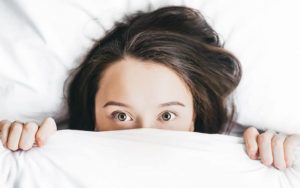The US National Sleep Foundation recommends adults aged 26-64 years obtain on average 7-9 hours’, range 6-10 hours’ sleep per night.
Strategies to help you get your best night’s sleep:
Devices
Turn off the screens, including TV, radio and mobiles to help your mind and body switch off well before bed time to allow melatonin and cortisol levels to normalise. Replace screen time with reading a book, listening to music, talking to spouse and/or children face to face – about how their day went, what they are excited about or struggling with. Use blue light blockers on devices to help make more melatonin at night.
Caffeine and alcohol
These affect adenosine, a neurotransmitter which decreases neural activity and facilitates sleep. Caffeine blocks adenosine receptors so you have less deep sleep and more night time awakening. Caffeine as a half-life of 4-7 hours, so avoid after 2 p.m., or noon if especially caffeine-sensitive9. Alcohol alters the signaling of adenosine so you fall asleep quickly, but like caffeine, also affects deep sleep. Alcohol consumption carries health risks, therefore the recommendation is to avoid alcohol. But if you still chose to drink, avoid it within 3 hours of bedtime.
Schedule
Regular sleep schedule keeps the circadian sleep/wake cycle synchronised – fewer reports of insomnia and depression. So, get up the same time everyday even after a late night or fitful sleep. Aim to go to sleep within a few hours of it getting dark. Be guided by season, somewhere between 9.00 and 11.00pm.
Gut microbiome
These activate the vagus nerve, affecting the circadian clock and visa versa. They also activate gut endocrine system and are primary producers of neurotransmitters and neuropeptides e.g. dopamine, serotonin and GABA. In fact, the gut has 400 x more melatonin than pineal gland in brain. So, eat a wide range of whole, minimally processed plant foods of varying colours – vegetables, fruits, and whole grains – which are high in fibre and nutrients, as these are instrumental in restoring and protecting the beneficial bacteria in your gut, and avoid eating 3 hours before bedtime.
Exercise
This enables falling asleep faster with more time in deep sleep and less night time awakening. It increases serotonin synthesis/release and also increases tryptophan. Working out in the morning or afternoon is fine but the early morning seems to be the most beneficial time as it facilitates greater time spent in deep sleep. Exercise (aerobic, resistance, stretching) stimulates the body to secrete the stress hormone cortisol, which helps activate the alerting mechanism in the brain, so, avoid within 2 hours of bedtime and choose quieter activities after dinner to prepare your body to wind down.
Inner chatter
Taking to bed worries about a problem or a long to-do list can be a recipe for insomnia. Stress, aka fight or flight response, is a normal sympathetic response to danger, but has become chronic in our fast passed world. Even perceived threats can activate this response. But we can switch to the parasympathetic response, known as rest and digest response. During stress, our breath is shallow and rapid – sympathetic, but it can be switched to a relaxation – parasympathetic – response through rhythmic deep breathing. Mindfulness and meditation can also help. Mindfulness is not rushing off into future thinking about all the things you need to do. Meditation is the act of giving your attention to only one thing, either as a religious activity or as a way of becoming calm and relaxed.
Relaxing rituals
Well before you turn in, write down worries and list of tasks you want to remember in a “worry journal”. Closer to bedtime, try comforting rituals that may help lull you to sleep, such as soft, calming music; a warm bath; reading by soft light; sitting quietly and focusing on your breathing. Once in bed or if wake up in night and can’t get back to sleep within 20 minutes, get out of bed and do something relaxing until you feel sleepy again, but keep the lights dim.
Sleep environment
Blocking out light is one key, as is temperature. Core temperature drops to help initiate sleep and insomniacs appear to have higher core temperatures. We seem to sleep best at room temperature around 16 – 24oC (most commonly 18oC). Mattress cooling pads may help in those with higher core temperatures. A quiet bedroom is also important, particularly for older adults who spend less time in deep sleep. Run your appliances before bedtime. White noise, e.g. fan, air purifier, nature recordings can calm and elicit sleep.
Source #lifestylemedicine

